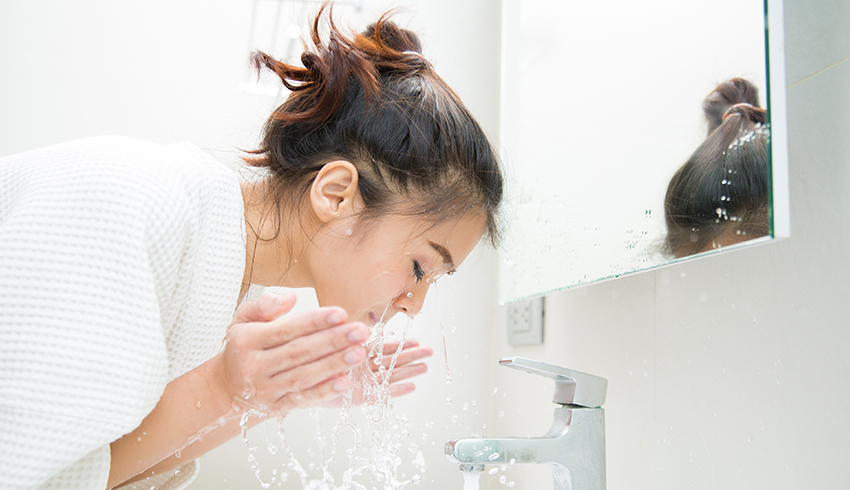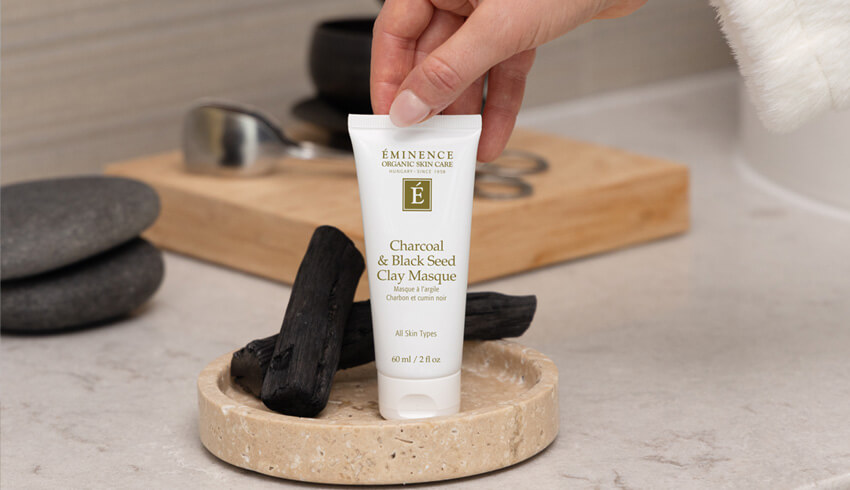
If you have acne or problem skin you may have a love-hate relationship with SPF. Traditionally, sunscreen doesn’t have the best reputation for treating problem skin types as it can feel irritating, greasy and pore clogging. However, skipping an SPF altogether also isn’t the best choice. Unfiltered UV rays can aggravate sensitive pimples, increase the appearance of blackheads and cause more harm than good. Not sure what to do? We’re here to help. Read on for our breakdown on why sunscreens can make acne worse and how you can ensure your skin is protected.
Does Sunscreen Cause Acne?
While sunscreen doesn’t necessarily cause acne, just like any other skin cream, certain formulations may contain pore-clogging oils and silicones. If you have problem skin in the first place, these ingredients can trap pollution and bacteria on the skin, leading to more pimples, irritation and milia. If your skin is also sensitive and/or reactive, chemical formulations can sometimes lead to tight, red skin as UV-absorbing ingredients are also taken into the skin.
Aggravating both sensitivity and breakouts even further, many traditionally-formulated mineral and chemical sunscreens just don’t allow the skin to breathe. While this means that nothing can get in (sun rays are blocked), nothing gets out either and heat is effectively trapped against the surface of the skin. This heat creates the perfect breeding ground for bacteria and inflammation, potentially leading to further breakouts.
Can People With Acne Wear Sunscreen?
Despite the fact that certain sunscreen formulations can aggravate acne, it is crucial to wear SPF daily. While there is some truth to the old adage that UV rays can help clear acne, doctors do not use or recommend UV rays as a treatment as the dangers far outweigh the benefits. Instead, dermatologists or spa professionals use modern light treatment for acne, beaming red and blue light waves over the skin to kill acne-causing bacteria.
As many acne-fighting treatments contain exfoliating agents that make the skin more sensitive to light, hyperpigmentation and burning are serious concerns. Especially if you have a darker complexion, this can lead to sunburn and even permanent discoloration. Of course, it is important to remember that, for anyone and everyone, the negative effects of UV exposure include DNA damage, skin cancer, loss of collagen and wrinkles as well. With this in mind, not only can people with acne wear sunscreen, but they should wear sunscreen.
What Sunscreen Should I Wear?
If sunscreen can cause your blemishes to worsen, but not wearing it can permanently damage your skin, what are you supposed to do? The key is looking for specific ingredients that will let your skin breathe while also protecting from the sun’s harmful rays. Many dermatologists and estheticians suggest seeking mineral sunscreens containing zinc oxide and titanium dioxide.
Zinc oxide and titanium dioxide are minerals that reflect the sun’s rays away from the skin. As the names imply, zinc oxide comes from zinc and titanium dioxide from titanium. The reason these ingredients are so often recommended for problem and sensitive skin types is that they are non-comedogenic (will not clog pores) and hypoallergenic. Eminence Organics Lead Skin Care Trainer Natalie Pergar explains: “Because these minerals allow the skin to breathe, the skin is able to stay cooler, making it less prone to inflammation and breakouts.”
The key to these ingredients working so well is that the particles are small enough to blend into the skin without feeling heavy but not so small that they can travel into the skin. If you’re looking for a line of products encompassing these features, we recommend our Lilikoi Mineral Defense Collection. This collection uses a combination of finely ground, non-nano zinc and titanium dioxide to provide lightweight, mineral sun protection.
As Natalie explains: “Lilikoi Mineral Defense products are suitable for all skin types, provide broad-spectrum sun protection and allow the skin to breathe.” Additional benefits of the collection? The key ingredient in all three products, lilikoi, is rich in vitamin C, vitamin A, niacin and riboflavin. These ingredients can help treat and prevent the look of hyperpigmentation and leave the skin looking nourished.
The Lilikoi Mineral Defense Moisturizer SPF 40 contains zinc and satsuma mandarin peel extract with calcium and magnesium, which can improve the look of breakouts.
Our Lilikoi Mineral Defense Sports Sunscreen SPF 30 is formulated for both face and body and is excellent when the summer heat is in full effect. Extremely lightweight, this sunscreen is also water resistant and friendlier to reefs because it does not contain oxybenzone or octinoxate.
Product Picks
Not only is the Lilikoi Mineral Defense Collection a great option for people with problem skin, but it is also a great choice for all skin types and anyone interested in an all-mineral SPF formulation. Do you have problem skin and struggle to find an effective SPF? Let us know in the comments below or on social media.




